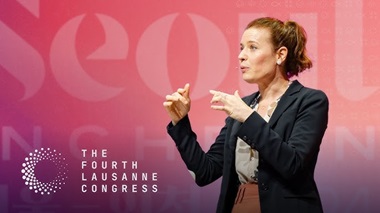
Julia Garschagen of Pontes Institute for Science, Culture and Faith in Germany offered a compelling message on the sacredness of work. Photo: Lausanne Movement
I recently got back from Seoul, Korea, where I was fortunate to be one of 5,400 delegates from 202 nations for the Fourth Lausanne Congress, a global gathering of evangelical church and mission leaders, to dialogue together on the big topics in world mission today.
Lausanne has been a meaningful part of my vocational story. As a college student, I was a ‘steward’ (volunteer) at Lausanne III in Cape Town, South Africa [in 2010].
That gathering set the foundations for the next decade of my ministry life, from my early years with OneHope working on collective impact strategies for next-generation discipleship, to following [Tim] Keller’s call to pastoring in NYC and working with church planters in western cities. In 2016 I went to the Young Leaders Gathering in Jakarta.
I’ve been deeply shaped by the work of Ralph Winter and other leading missiologists who shaped the vision of the movement. Lausanne has been a unifying framework for me across many seasons.
It was timely to be in Korea, as we’re building Missional Labs to be an innovation and design partner toward many of Lausanne’s Great Commission goals.
I wanted to offer some high-level takeaways on what I observed, with some thoughts on the significance of this congress for our work, and for the wider evangelical mission enterprise as a whole.
Toward polycentric mission

Some 5,400 leaders from all over the world participated in Lausanne 4.
The gift of Lausanne is its global vision (“the whole church taking the whole Gospel to the whole world”). This big-picture centering of the missio dei, paired with the ambition to convene a truly global set of leaders, is remarkable. Congress director Michael Oh commented that it might have been the most global gathering in history, which did not feel like hyperbole.
There is so much power in this – talking and worshipping together raises us out of our provincial settings and disputes (e.g. American politics), and reorients us to the wider frame of Global Christianity. At my dialogue table were leaders from persecuted parts of India and war-torn Ukraine, asking the same questions I was about the Church.
Lausanne’s name for this increasingly global era of the Church is polycentric mission. In a time when Christianity is being challenged in the west, polycentrism is offered as a paradigm of hope, as the global church rises up, rebalances old power-dynamics and renews the whole.
In practice, polycentric mission is still emerging and aspirational. Western delegates remained overrepresented, with our financial capacity to support the congress and the power of Western passports reinforcing the imbalance (many delegates from other nations weren’t able to get their visas).
In truth, most of the institutional capital for world mission still exists primarily in the Christian west – mission historically runs on the economic and political engines of its time, and the west still has a big role to play, especially as rising economies (India, China, etc) are not friendly to Christianity. This is a global reality we must work within, and the power dynamic needs to be named and leveraged humbly.
For polycentric mission to further mature, the permission structures of the west need to be continuously challenged by interaction with non-western voices. Western resources need to be brought collaboratively to the table, avoiding the temptation toward a new provincialism that would avoid global mission completely for local concerns, and the temptation toward a new colonialism of money and ideas and tools. We should further explore ways to come alongside national leaders and projects, and to bring our specializations to help them build their own institutional capacity.
The vision toward polycentrism is hopeful and exciting. Honesty, humility, and global friendships are critical factors for this to go further.
The whole Church?
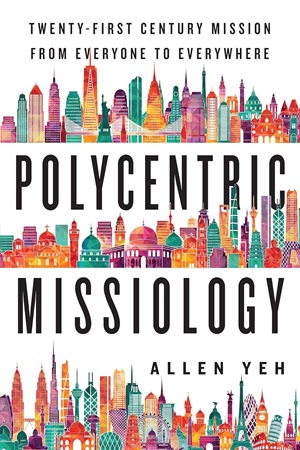 Lausanne is evangelical, in the tradition of Billy Graham and John Stott, the two pillars of the original movement. This is a strength, as world mission has been heavily energized by evangelicals since Edinburgh 1910. This evangelical center means a high prioritization on empowerment and participation toward the mission task.
Lausanne is evangelical, in the tradition of Billy Graham and John Stott, the two pillars of the original movement. This is a strength, as world mission has been heavily energized by evangelicals since Edinburgh 1910. This evangelical center means a high prioritization on empowerment and participation toward the mission task.
(This sense of agency, with some pragmatism, are the markers of evangelical missions in the American century, often eschatologically undergirded by an urgency to ‘finish the task‘ by year 2000, year 2033, etc, leading to mixed results).
Lausanne sits in the larger context of various ecumenical mission conferences of the past, which have led to a few fault lines (Allen Yeh wrote a great book about this).
This gathering wasn’t very ecumenical beyond evangelicals, even as vibrant renewal has happened in other Christian spaces in recent years. This surprised me somewhat – there were few charismatic Catholics or Anglicans, and a lack of presence from leading Pentecostal institutions overall (Billy Wilson, who spoke at the plenary, was the notable exception).
Lausanne is still largely built on an American evangelical sociology, heavy on representatives from Wheaton, Christianity Today, Campus Crusade, Intervarsity, NAE, etc., and heavily weighted toward historic parachurch and mission structures (vis-a-vis local church structures, more on that below).
I’m sympathetic to needing boundary lines for the sake of focus, and I’m sure the selection process is challenging but this was still a big limitation from my perspective.
What counts as mission?
 I’m always listening for emerging paradigms of ‘prioritization.’ Lausanne has historically been a place to work out what the big issues of the day are, from naming the ’10/40 window’ or identifying ‘unreached people groups,’ which have given unifying frameworks to the wider mission enterprise.
I’m always listening for emerging paradigms of ‘prioritization.’ Lausanne has historically been a place to work out what the big issues of the day are, from naming the ’10/40 window’ or identifying ‘unreached people groups,’ which have given unifying frameworks to the wider mission enterprise.
These have emerged from Lausanne as very helpful manifestos (they added the “Seoul Statement” to their library this year, which I won’t review here)
Many of the inherent tensions in mission play themselves out here, i.e., whether we should focus on evangelism or social action, whether we should focus on post-Christian spaces or pre-Christian ones and how much we should address key issues, like the next generation, encountering Islam, serving the poor, engaging politics, etc.
The 50-year history of Lausanne is in many ways the dialectic between Graham (evangelism) and Stott (holistic mission).
I do think Biblical theology itself creates the tension. Stephen Neill famously said “if everything is mission, nothing is mission,” to which (Lausanne theologian) Christopher Wright said, “If everything is mission, then yes, everything is mission.”
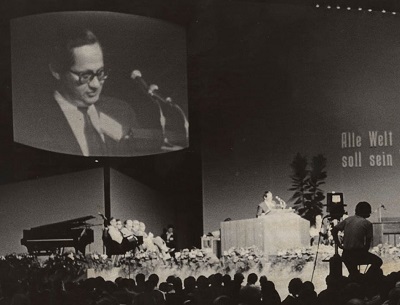
René Padilla addressing the 1974 Lausanne Congress. He called on American evangelicals to repent for exporting the “American way of life” to mission fields around the world, lacking a sense of social responsibility.
There is a tension between the urgency and primacy of the evangelistic task, and the call to continue to be agents of renewal and redemption across all of our social, cultural and ecological spaces. Newbigin called it the missionary intention vs the missionary dimension.
Lausanne attempted a synthesis of key issues with their ‘25 Gaps,’ which came out of a listening process and their State of the Great Commission report, and does an admirable job creating a modern taxonomy of mission priorities, and tries to use this to frame subsequent issue networks.
But the theological tension underneath makes it messy. Creating a long list of priorities under the umbrella feels more dilutive and less helpful than really clarifying a point of view on what’s most critical right now.
The net effect is a weak agenda for the world of leaders, organizations and funders. At best, this decentralizes and empowers decision making, but it also maintains the status quo for our biggest challenges (i.e., reaching the global unreached).
Polycentrism implies a lack of a geographic or institutional center, but we have to be careful that it doesn’t lose a conceptual center.
It feels like the next paradigms for mission are still emerging – I’d love to see more work done here. It’s so important to get the organizing frameworks right.
Church, ministry, mission, marketplace
There was a big emphasis this year on ‘marketplace leaders,’ which meant the presence of over 1,000 high-capacity business leaders across tech, finance and media, etc, to talk about how to build business strategies as a meaningful form of mission, and how to leverage the strengths of business professionals for the wider missional task.
This is a major net positive and should be celebrated, as “99 percent of Christians are in the marketplace,” which was often-quoted. It shows the growing resonance and influence of Business as Mission, Faith and Work, Redemptive Entrepreneurship and Faith-Driven Entrepreneurship as movements and paradigms. It felt like the marketplace track was ‘where the energy was,’ and I think it’s something the Holy Spirit has been doing in the wider Church.
As I sat in these sessions, it also raised new sets of questions and challenges for me, especially in the vacuum of clear thinking about our mission priorities.
One, while a strong marketplace vision of mission mobilizes the priesthood of all believers into all of life, and often mobilizes our most high-capacity leaders, it also runs the risk of undermining a robust ecclesiology. What is the local church actually for, when it’s not always the most strategic vehicle for resource development or scalable impact?
Most delegates at the congress operate at the institutional level, leading nonprofits, colleges, businesses, networks and funds. There were few local pastors or church planters. Marketplace paradigms can accidentally reinforce a notion that strategic leadership is more critical than spiritual leadership (‘kingly role vs priestly role,’ I heard a few times), and that true missional impact is about reintegrating ‘the executive function of the body.’ There is a subtle sense that serious leaders don’t work for churches anymore.
In some ways, this dynamic isn’t new. Mission structures, built to accomplish impact goals, have always existed in a healthy tension with .congregational’ structures, built to worship and care and equip. This plays out in our tensions between ‘church’ and ‘parachurch‘ or between mass evangelism and deep discipleship. Marketplace ministry is simply the new parachurch. Ralph Winter talked about this a lot in Church history.
But an unintegrated or weak ecclesiology can lead to functional pragmatism, and we all inevitably will borrow paradigms about world-changing from other sectors, whether philanthropy, venture capital, government, social innovation, etc. This is not inherently bad; we should be in honest pursuit of impact as part of our missional responsibility and use all of the conceptual tools available to us.
But this can also lead us into soft syncretisms with modern (capitalistic) assumptions and imagination around investment, return and impact that are unfamiliar categories to the Gospels.
How are Christians meant to organize for common good impact in ways that are also prophetically distinct from the world? If mission is just a memetic, Christian-ish form of social entrepreneurship toward UN development goals, I think we lose our kingdom distinctives rather quickly.
To have a rich imagination for mission that integrates and bridges the unique methodologies of business, social sector, philanthropy, and the local church, we need to recover a theological vision of what the Church (gathered and scattered) actually is, why it matters, how it is distinct as a social organism and alternative community, and how it participates in the work of renewal in countercultural ways.
I think we always risk designing mission strategies in a boardroom rather than in a prayer service. We risk building collective impact models with no incarnational presence. We should actually be cautious about building solutions that the market or the state love, and be wary of the temptation to design with a thin view of the church.
I’ve been a pastor, a theologian, a mission executive, worked with church planters and worked with social entrepreneurs, so this is an integration quest for me. Missional Labs sits in creative tension between many of these questions as well.
I’d love to see a theologically rich conversation between church, parachurch, business and funding leaders on what we each bring to the missional task, and explore strategies for mission that are conversant with each of them.
Collaboration and/or innovation
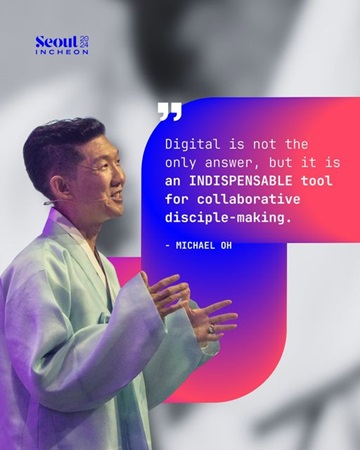
The Lausanne Movement’s Global Executive Director / CEO Michael Oh addressed the significance of technical engagement.
Related to some of the above themes, there was significant emphasis on both ‘collaboration’ and ‘innovation’ at the congress – but with those two ideas seeming to mean very different things.
Collaboration, functionally, meant organizing the existing stakeholders around topical tables based on the 25 issue gaps, for the sake of shared action.
In theory, if we can do that efficiently enough, we can build dense networks around issues and regions, tap into the collective wisdom of the whole, surface key issues and ideas and do some ‘meta analysis’ on how we might all work better together (extra points if AI helps us synthesize it), get everyone on a digital platform, and then . . . take action.
In this sense, collaboration becomes a ‘centralizing’ paradigm, about avoiding duplication and bringing people together under shared agendas, and calling it collective impact. I’ve been in a number of ministry collaboration spaces like this, gathered under the idea that the Church is called to be united.
The result can often be an entrenching of existing network structures and a weakening of diverse or emergent forms of specific local action. Collaboration-as-centralization actually undermines creative, polycentric mission, in a sense. Someone has to set the agenda for the collaboration, someone has to talk more, and everyone at the table has to do slightly less of what they are specifically called to do in order to participate fully. This is a challenge I don’t hear anyone talking about.
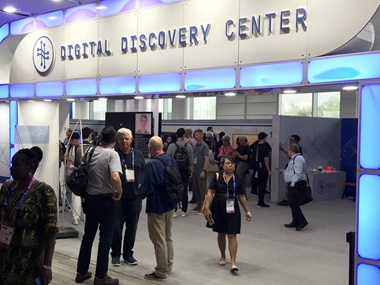
The Digital Discovery Centre was part of Lausanne 4.
Innovation was also heavily featured, but was a bit of a thin concept for Lausanne. Innovation basically meant ‘technology,’ and the Digital Discovery Center was a showcase for new applied technologies with missional use cases, like AI, or Web3 protocols, etc.
As far as it goes, this is fine and important: mission has always lived in a creative interaction with new technology, and has even led the way on many innovations.
But it misses the larger picture, that innovation is actually a sociological process, not just a technological one. All of the digital teams in the expo – regardless of the quality of their product – were high on talent, vision and energy, and likely low on funding, distribution and connection to bigger networks. That’s why they came to the expo.
To me, this speaks to the big structural weakness – the gap between today’s stakeholders and tomorrows innovators. Most new forms of church, mission and ministry that I see today ‘on the ground’ are not connected at all with the meta-structures of mission capital and institutions.
Innovation in my view is more likely to be discovered ‘outside’ the system than to be built ‘inside’ the system (we actually helped Lausanne identify numerous projects for the digital expo from our work at Missional Labs). In this view, collaborative impact should be focused on discovering, connecting and resourcing emerging innovators and models, rather than trying to come up with shared action plans on a white board within the system. This is the heart of the Two Loops paradigm of social change, which I gave as a breakout talk.
We need better bridges between the existing loop and the emerging loop, but this is hard because of the social location of the existing loop (most institutions undergirding Lausanne are quite old) and the huge distance between the global network and the field. This means the critical resources that might support meaningful emergence don’t get deployed early enough; so many ‘innovators’ never make it to the table.
I think this is an existential risk for Lausanne (and many groups). We need the resources of the existing movement to more readily find and invest in the emerging movements, before it’s too late.
Mission, the Spirit and the future
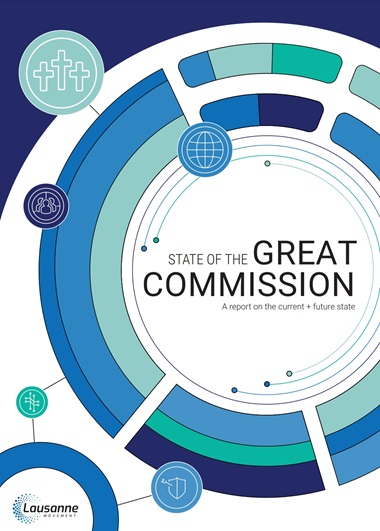
Lausanne 4 participants were urged to read the 500-plus page ‘State of the Great Commission Report’ before attending.
Lausanne’s mission statement is ‘accelerating global mission together.’ The conversation underneath it all is ultimately, ‘how?’
This is a theory of change question.
My core conviction is that the history of the Great Commission is primarily a spiritual story: the Holy Spirit, working through apostolic leadership, radical community and deep sacrifice, leads us out onto the frontiers of faith, out of a deep overflow of love.
These ingredients plant the seeds of prophetic legitimacy and continuous renewal that grow into vibrant Gospel movements. Mission is the work of God’s Spirit through his people.
It is only secondarily a sociological story – a story of technology, leadership skill, organization, translation, capital allocation, networks and institutional sponsorship. James Davison Hunter is only partially right.
In truth, we need both, in dynamic interaction. Strategic networks without authentic spiritual vitality, and prophetic imagination at their core, will struggle to change the world in the way of Jesus. Mission pioneers on the redemptive edge will fail to reach their potential if they have no bridge to the networks and resources they need.
We need Gospel ventures and Gospel patrons, together, with the Holy Spirit at the center.
One of my favorite memories at the conference was finishing a strategy workshop, and then breaking into a time of spontaneous prayer with a small group of six others, many of whom I’d just met, on our knees in a breakout room for an hour together, listening to the Holy Spirit and seeking his presence.
This hour did more for me than 100 strategic hallway conversations. This is what I hope to see more of in the mission movements of tomorrow.

Tyler Prieb
Tyler Prieb is Co-founder and Executive Director of Missional Labs, which describes itself as “an innovation lab for the future Church. We launch next-generation leaders, ministries and movements for Great Commission impact.” He and his family live in Nashville.
I (Flyn Ritchie) had been planning to write an assessment of Lausanne 4, which I also attended (I have already posted a couple of articles and plan to do three more personal profiles). However, when fellow Vancouverite Stephen Mulder (Co-founder and Senior Director for Partner Engagement with Missional Labs, also a Lausanne 4 participant) sent me Prieb’s reflection, I thought, well, he’s already done the work, and better than I would have. So thank you Stephen and Tyler.
Another very good reflection on Lausanne 4 was posted by Ontario participant Peter J. Schuurman. Among other things, he is the author (with Angela Reitsma Bick) of Blessed are the Undone: Testimonies of the Quiet Deconstruction of Faith in Canada (New Leaf Network Press, 2024).
Trevin Wax also contributed a useful overview of Lausanne 4, on The Gospel Coalition blog. And Lara Heneveld contributed a ‘nuts and bolts’ write-up on the gathering for The quarterly bulletin of the Global Community of Mission Information Workers.
